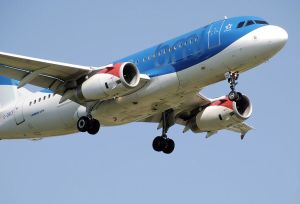Friends, leaders, environmentalists, we would like to hear you speak more about the aviation industry.
Many influential writers and activists on environmental issues address the fossil fuels industry, but rarely discuss the aviation industry. There are some exceptions, such as Alice Larkin (@AliceClimate), Kevin Anderson (@KevinClimate), and George Monbiot (@GeorgeMonbiot), who frequently address aviation. Many others seldom do. Check the Twitter feeds of your favorite environmentalists. Search for your favorite climate change writer’s Twitter handle plus the words “aviation” or “flying.” Tabulating a sample of tweets for one high-profile climate change thinker this week, I find 45% are about the fossil fuels industry, 10% clean energy, 45% politics or activism, and 0% aviation, automobiles, home heating, or other industries that actually use fossil fuels.
Perhaps the movement finds it easier to talk about energy production than energy consumption. This may be fine for some consumption uses, but not others. At one extreme, replacing fossil fuels with clean energy in the electric grid may be more fruitful than reminding people to turn off lights. As a middling case, replacing gasoline cars with electric cars may be partially helpful. And, at the other extreme, we have aviation. We are skeptical about mainstream media coverage of biofuels, electric flight, and offsets. Changes in aggregate demand are fundamental for this particular critical industry.
It is unjust and unreflective to call for drastic economic changes in the fossil fuels industry while remaining silent about the aviation industry. The geographic locus of conflict over fossil fuels is in the coal mines of Appalachia, the oil wells of Oklahoma, and the gas extraction sites of North Dakota. The geographic locus of conflict over aviation would be in airports filled with comparatively privileged travelers, and (as @AntiAeroGAAM reminds us; added Feb 8) in the fields and communities displaced or damaged by new airports and airport expansions. It feels immoral to ask coal miners to be good sports about the economic transition they face, while remaining silent about the changes required for frequent flyers.
In public debate and in the theater of public engagement to protect the environment, the aviation industry deserves a place alongside the fossil fuels industry. We appreciate the occasional tweets and articles by leading environmental writers and public speakers about aviation already, but the issue deserves more. For example:
- Along with articles about tax breaks for Exxon, let’s have more articles about the more universal tax breaks for jet fuel.
- Along with articles about the Paris Agreement, let’s increase coverage about the omission of international aviation from that agreement.
- Along with coverage of EPA’s failures to regulate carbon from energy plant emissions, let’s write more about the International Civil Aviation Organization’s (ICAO’s) inadequate approach to addressing aviation emissions.
- Along with reports about sacrifice zones and spills from pipelines, let’s give more attention to the daily noise pollution and localized air pollution for low-income neighborhoods near airports.
- Along with editorials calling for divestment from fossil fuels, let’s consider divesting from the aviation industry.
When I raise this issue, friends sometimes say that environmental progress requires a steady focus on policy change and industrial transformation. They say talking about “personal change” would be a self-indulgent distraction. Yet, I don’t see why the aviation industry is equated with personal change, while fossil fuels are treated as an issue of industrial structure. I do wonder whether high-flying personal habits induce a cognitive dissonance, which has muted environmental writing addressing the aviation industry. Conversely, I suspect more political writing about the aviation industry would trigger contemplation of personal change. My own experience, and that of some authors involved with our initiative, is that flying less can be part of a slower lifestyle that is simultaneously good environmentalism and joyful. But, this personal change is not the goal of this blog post, which is about hard-nosed coverage of aviation as an industry.
Friends also sometimes describe their own flying for environmental work as essential. Yet, environmental NGOs and researchers alike could still adopt a reasonable budget for aggregate reductions in flying for environmental conferences, prioritizing a smaller number of high-impact flights. Thinking about the COP meeting in Paris, many European participants traveled by train and bus, and the conference would have been just as successful if they all had done so. As for the enormous U.S. presence, my friends and colleagues were inspired by their experience in Paris, and yet our next important work may involve more domestic travel to bridge the political and cultural gulf that produced U.S. withdrawal from the Paris agreement. Clearly our first work is at home. The question is not about judging environmentalists; the question is about having the small public interest non-profit sector demonstrate how to do its small share, at a time when courageous changes are expected from every major sector of the economy.
I recognize that most of the world’s greatest environmental writers focus on broad social transformation. In the spirit of this broader transformation, I say to them it is both fair-minded and strategic to quit the soft treatment of the aviation industry. I’ve said enough on this myself. I am ready to hear from you, whether you agree or disagree with me, so long as I don’t hear a deafening silence. Friends, speak up more about the aviation industry.

By Adrian Pingstone (Own work) [Public domain], via Wikimedia Commons

Reblogged this on .